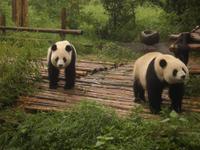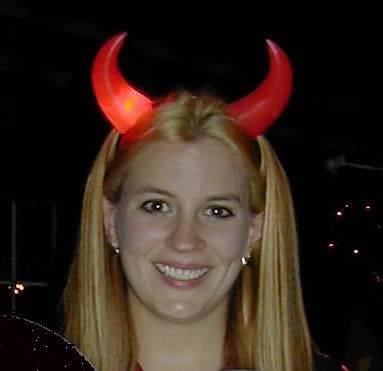Days 5-7: Xi'an
We arrived in Xi'an at 7 am (having been woken by much shouting from the train attendants at about 5:30). After dropping our bags at the hotel, which was very conveniently located on the central square, we immediatly took off for a walk around. The most interesting part of Xi'an is the Muslim Quarter, home to a large population of Chinese Muslims. The area around the mosque was full of all sorts of souvenir shops, so I shopped around for a bit with Murray and Georgina. Bargaining there was tough as all get-out, and so after haggling for 20 minutes with a woman who wanted 1,500 quai ($180!) for three "jade" glass bracelets - I eventually got her down to 80 for the three, and she was pissed - I gave up on the shopping and visited the mosque instead. A beautiful, serene spot with a really interesting pagoda-style minaret. On the way back to the hotel I acted on Dylan's recommendation to try out whatever street vendor food looked interesting, and ended up with an absolutely delicious round philo-dough thing with beef and spring onion inside. Even better, only two quai (about a quarter). Later that afternoon I visited the Bell Tower in the center of the city, where the views were great and I caught a traditional Chinese-instrument performance (including a "sleeve dancer" like in
House of Flying Daggers), and then went to get a hair wash at a local salon. I got a shampoo with scalp massage followed by a shoulder, neck, and arm massage for less than $2. Naturally I got one again the next day - too good to pass up!

We spent the morning of the following day at the famous Terracotta Warriors, I think the primary reason why Xi'an is on anyone's itinerary. We didn't have a great guide, which probably affected my impression, but overall I wasn't as impressed with the warriors as I expected to be. The problem with having expectations, no doubt. Honestly, though, the Muslim Quarter was much more interesting and fun than the warriors. Nevertheless, I do recognize their value and importance and was grateful we got to see them. Their age is astounding. For those of you who don't know, the emperor for whom the warriors were made was the same emperor who started the construction of the Great Wall, Qin Shihuang. His tomb, as yet unopened, is said to be the largest tomb in the world (yes, surpassing even the pyramids). Ah, to have been an emperor back in the good old days!

Our feasting highlight for Xi'an was a kebab place Dylan took us to in the Muslim Quarter. Very, very basic, loud, and cheap. Dylan, Murray, Craig, Jennifer, and I actually went back the second night, too, while the rest of the group was out having a fancy dumpling banquet elsewhere. One of our orders, "Crispy Fried Chicken" on the menu, came with the chicken's head on the plate, so I dug out and ate the brains. It was perfectly delicious.
On Saturday, July 16 - some of you probably already have this date memorized - the sixth Harry Potter book came out. I was blown away to hear from the Scots that they had found a place on Friday that was taking deposits and selling the book. English copies, even! In Xi'an! All together our group ended up with four copies. Crazy. It was also our last day in Xi'an and Murray's birthday, so we celebrated the latter with cake (a very Western cake, actually, which we ate with forks!) in one of our soft sleeper compartments on the train. Since the train journey (to Chengdu) was pretty long and we had boarded early in the day, Dylan brought out a game he had invented for us to pass the time. The game worked as follows: a team of two sat across from each other at one of the little tables in the compartments. Dylan then put five regular and five peanut M&M's on a tray on the table.

Within the five-minute time limit, one of the team members had to pick up the M&M's with chopsticks and pass it to the other teammate, who would then eat it. Each team got one chance. At first no one could get all ten M&M's within the time limit, but eventually the team of Georgina and Jennifer got all of them in 4 minutes and 25 seconds. The pressure was on! The position I had drawn with my teammate Cliodna was second to last, a perfect place to be. We started up and quickly fell into the pattern of me picking up the M&M and passing it to Cliodna. In a whirlwind of chopsticks and M&Ms, we thus polished off the plate in a record-setting 2 minutes and 5 seconds. Champions!
Seems like enough excitement for one train journey, I know, but actually there was more. Around midnight, when we were all in bed, our compartment was awoken by a scream from Eileen. A rat had just run across her hair! We turned on the light and looked around, but no rat. Eileen traded bunks with Britta, who was in the upper bunk above her, and we tried to go back to sleep. Five minutes later I felt the rat scurrying along my pillow and shouted to scare it off, whereupon the whole process of turning on the lights and looking around commenced all over again. Finally Britta and I, being the two on the bottom bunks, turned around so that our heads were on the opposite ends of the bed and went back to sleep. Yet another one of those stories that just make your trip more memorable.
 Days 16-19: Yangshuo
Days 16-19: Yangshuo things around in the wok, and of course the food was ten times more delicious since I made it myself. The following day our entire group rode out on a bike ride through the countryside. It wasn't long before the smooth pavement gave way to rutted, stony dirt paths that were a challenge to navigate but took us through some amazingly stunning scenery. After lunch we broke off into "long ride" and "short ride" groups. I was one of the four long riders, and I thought the ride back was even better than the ride out. Our guide Sally picked fresh peanuts out of the ground for us to try and even led us to a weir, which we had to walk across with our bikes (before it got too slippery, at which point we took a bamboo raft). We got back at 4, tired and dirty but very happy with the experience.
things around in the wok, and of course the food was ten times more delicious since I made it myself. The following day our entire group rode out on a bike ride through the countryside. It wasn't long before the smooth pavement gave way to rutted, stony dirt paths that were a challenge to navigate but took us through some amazingly stunning scenery. After lunch we broke off into "long ride" and "short ride" groups. I was one of the four long riders, and I thought the ride back was even better than the ride out. Our guide Sally picked fresh peanuts out of the ground for us to try and even led us to a weir, which we had to walk across with our bikes (before it got too slippery, at which point we took a bamboo raft). We got back at 4, tired and dirty but very happy with the experience.












